Whether you’re planning to travel to horse shows or somewhere special for summer trail riding, the road trip starts with one major decision: what kind of vehicle do you need to tow a horse trailer?
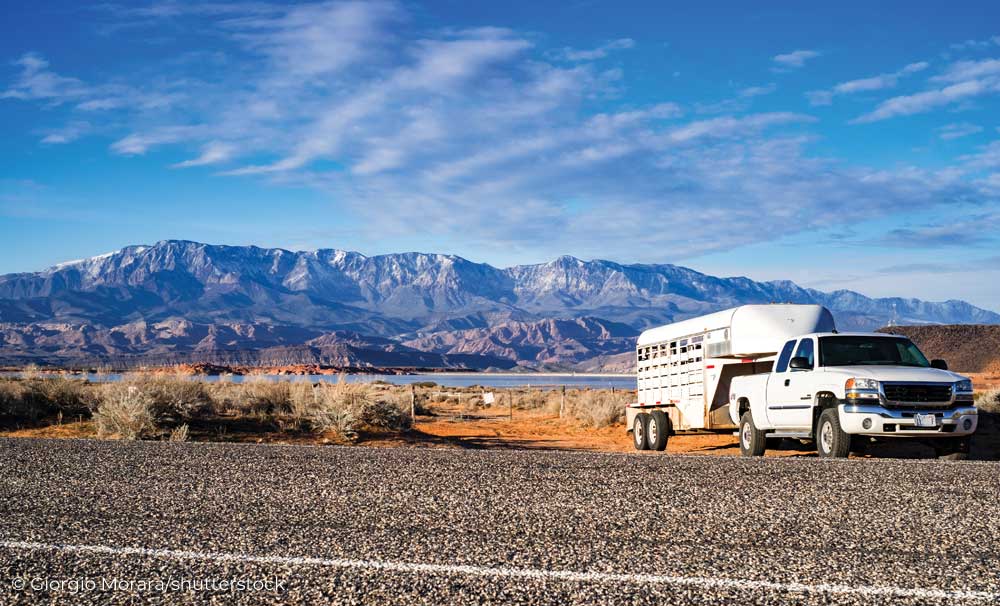
Even if you’re just hauling a lightweight two-horse trailer, it’s unsafe to pull with a vehicle that is too light or underpowered for the job. So how do you figure out how much pulling power you need without going overboard on more truck than necessary and breaking the bank?
You may be thinking, “I just want to take two horses to a show, what’s the big deal?” But if you’re going to haul your horses at all, then understanding towing power and trailer weights is actually very important for the safety of your family, your horses, and everyone else on the road.
Plan Your Towing Goals for Your Horse Trailer
In a perfect world, you would purchase a towing vehicle only after buying the trailer you want for the horses and cargo you plan to tow. It’s better to buy a vehicle to meet your towing needs rather than trying to adjust your tow load to meet the capabilities of an existing vehicle. For the advice in this article, we’ll assume that you’re able to shop for the vehicle with your specific trailer and towing plans in mind.
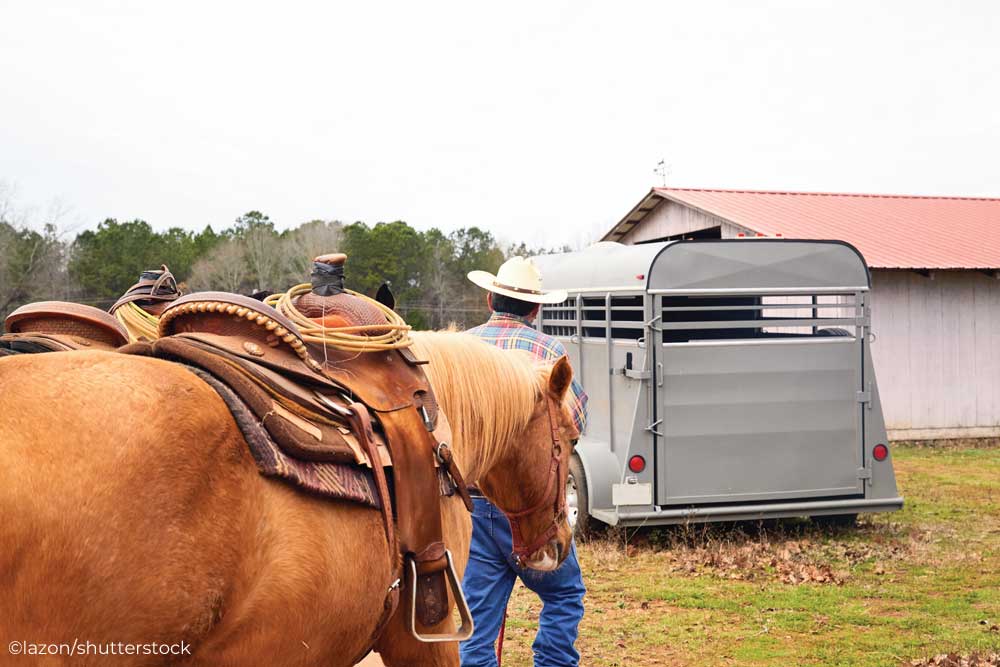
The first question to consider is: what would you like to haul? Two horses for a trail ride? Four, five, or six animals to a larger show event? What about camping—will you be using a horse trailer with living quarters or even a small camper unit on the back of your pickup?
The reason these questions matter is because they will all help determine the eventual weight of your trailer and cargo—and that will help you make a decision on your vehicle purchase.
Three Key Numbers To Remember for Towing
There are a few terms that you’ll need to be familiar with, but they’re not too challenging to understand.
1) GTWR: Gross Trailer Weight Rating
In some cases, the empty weight of your horse trailer will be included on either the trailer’s factory label or listed in your trailer’s manual or spec sheet. Obviously, the weight of the trailer needs to be lower than the maximum pulling capacity of the vehicle. But there’s more to it than just the weight of an empty trailer—don’t forget about the weight of your horses!
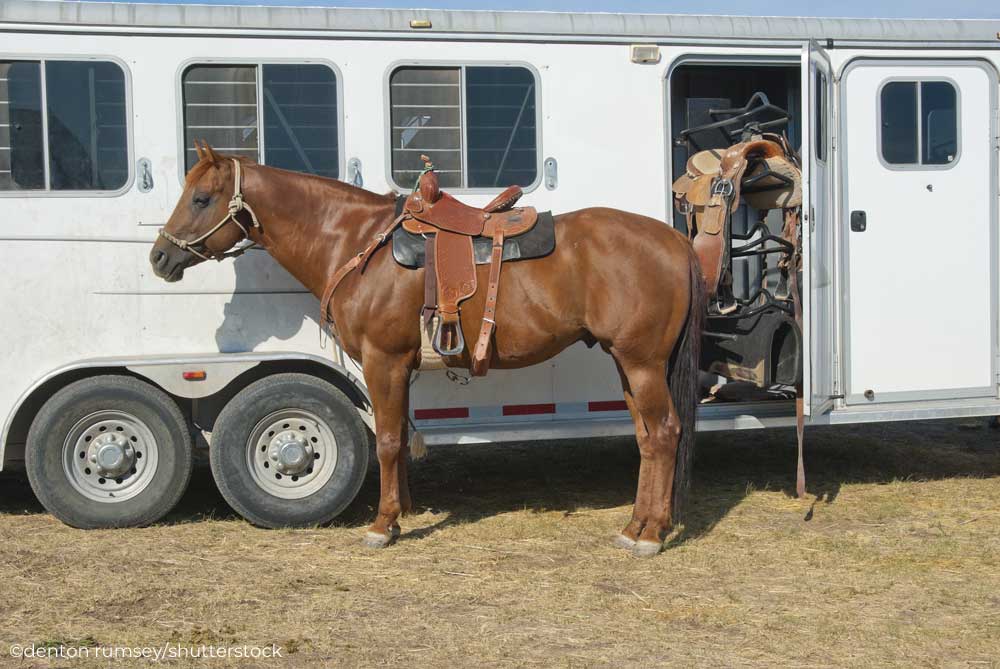
Add in two or three average-sized horses plus all of their assorted equipment—saddles, tack trunks, hay bales, full water containers—and you’ve quickly added a few thousand pounds of additional weight into the equation, all of which ultimately contributes to the gross trailer weight—the total weight of the fully loaded and ready-to-roll trailer.
To calculate this number, you may need to haul your empty horse trailer down to the truck weighing station and then add in the weight of your horses and gear.
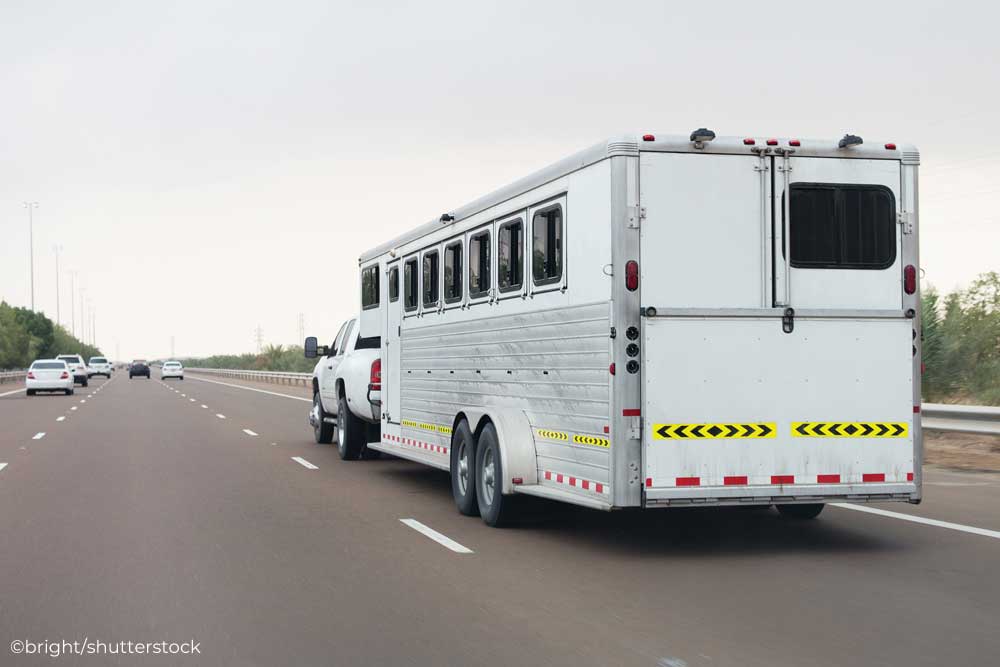
However, you probably don’t have to. Most trailer manufacturers already estimate the weight of the empty trailer plus all of its likely cargo and combine all of this into a handy number: the gross trailer weight rating (GTWR). The GTWR provides you with an excellent number for choosing a towing vehicle because it includes the trailer’s weight plus estimated weight of horses, along with some built-in wiggle-room.
As long as you don’t overload your trailer and surpass this number—which you shouldn’t as long as you’re using the trailer in the manner that it was intended—you’re probably in good shape.
2) GVWR: Gross Vehicle Weight Rating
The next number you’ll see tossed around in towing discussions is the gross vehicle weight rating (GVWR). This one is pretty simple, too—it’s just the weight of your truck plus the total weight of the fuel in the tanks, the passengers, and all of your stuff, like that cooler full of sodas for lunch at the horse show.
The GVWR is the weight guaranteed by the manufacturer that the vehicle can safely carry. Again, provided you’re using the vehicle in a normal matter, you shouldn’t exceed the GVWR. But overloading can be dangerous—like combining a bed-mounted camper unit along with the downward pressure of a bumper-pull horse trailer. Be sure your actual payload plus the empty weight of the truck is below the GVWR.
3) GCVWR: Gross Combined Vehicle Weight Rating
Finally, there’s the gross combined vehicle weight rating (GCVWR). This is the total weight of the other two numbers combined—truck, trailer, horses, people, cargo—everything you’re hauling.
If you stay under this weight, life on the road should be safe and easy. Go over this weight, and you risk prematurely wearing out your truck’s transmission, or worse, causing the brake system to fail en route.
Choosing a Vehicle to Tow Your Horse Trailer
So, what do you actually do with these numbers? Start off with the GTWR. If you recall, that’s an estimation of the trailer’s empty weight plus horses and cargo.
Armed with that number, you can start truck shopping, particularly paying attention to the vehicle’s tow rating, which will also be measured in pounds. Also, pay attention to the vehicle’s maximum payload. From there, it’s pretty simple: you need to purchase a tow vehicle that is rated to safely pull more than your GTWR, and still have enough power to haul your human passengers and truck cargo. That’s the GVWR.
Together, they form the GCVWR, which probably also has a safety margin pre-calculated. Try to find the GCVWR of a tow vehicle listed in the spec sheet while you’re shopping, as it will make life easy.
Do the Math
Keep in mind that you may have to do a little math and shop for a tow vehicle based on the GTWR and GVWRs alone. To help visualize all of this a little better, let’s use a specific example:
- Estimated weight of a loaded horse trailer (the GTWR): 5,000 pounds.
- Curb (empty) weight of a tow vehicle, minus the payload: (GVW): 6,000 pounds
- Maximum payload of the tow vehicle: 4,000 pounds
- This makes the maximum vehicle weight (GVWR) 10,000 pounds (6,000 + 4,000).
- Gross trailer weight (GTWR) of 5,000 pounds + the vehicle weight (GVWR) of 10,000 pounds = a combined weight of 15,000 pounds.
- As long as the vehicle’s maximum GCVWR—the two components added together with safety margin—is higher than 15,000 pounds, than this example rig would be ready to go.
Towing a Horse Trailer: The Fine Details
You’ll still need to pay attention to the details. For example, even if you choose a vehicle with a tow rating well above the GCVWR, the vehicle may not actually be able to pull that much weight without some other modifications (watch for phrases like “when properly equipped”), collectively known as a towing package:
- The Hitch: This is the connection between your towing vehicle and your horse trailer. Obviously, not all hitches are created equal, with some small hitches designed for light trailers and larger hitches intended to haul heavy loads.As such, hitches come with their own set of weight ratings, and these are just as important to consider as the other numbers. But it’s still a pretty simple concept: if your horse trailer’s GTWR is 8,000 pounds, but your hitch is only rated to 5,000 pounds, you will have overloaded the hitch and could create a dangerous situation.
Even if your truck has a towing rating far over 8,000 pounds, the hitch in this example is still the weak point of the whole system. Don’t assume that the stock hitch that comes with your towing vehicle is rated high enough for what you want to do.
- Stabilizing Bars: These long metal rods are fitted on to the hitch and placed under tension to help prevent trailer swaying.
- Modifications to the Vehicle: There may be additional changes made to the suspension, transmission, electrical system, and other aspects of the vehicle.
Also, keep an eye on:
- Trailer Tongue Weight: If you’ve ever watched a horse trailer being connected or disconnected from a vehicle, you already know that there is a significant amount of weight pressing down on the tongue of the trailer and onto the vehicle’s hitch: As the trailer is lowered onto the hitch, the rear suspension of the vehicle settles a bit in response to the additional load; when the trailer is removed, the rear suspension rises again.
Even though the large majority of the trailer’s weight is supported by its own axles—this is the whole point of towing a trailer—there is still a significant load pressing down on the tongue. Your tow vehicle needs to be able to support this additional pressure. It will vary from trailer to trailer, but is generally about 10 to 25 percent of the total gross trailer weight. - Wheelbase: This is the distance between the front and back wheels of a tow vehicle. In general, longer is better here, because it’s less likely for the trailer to cause the truck to fishtail if it has a longer wheelbase.
Be a smart buyer—ask questions, get answers, and don’t assume that a truck is ready to pull just because it’s big! Take a few short drives with your new rig to get used to driving a trailer before you head out on the highway. Now that you have wheels, riding adventures await down the road.
This article originally appeared in the June 2019 issue of Horse Illustrated magazine. Click here to subscribe!

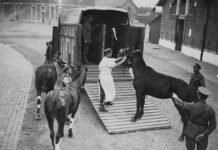

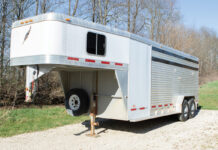


Good article, but you missed one of the most common overload situations I see all the time, gooseneck pin weight. You can stay within all the above numbers, but exceed the rear axle payload capacity of a single rear wheel truck with a larger GN trailer.
It’s great that you mentioned that I most likely don’t have to haul my horse trailer to a truck weighing station to know the total weight of the fully-loaded trailer. My father is planning to buy a new horse trailer for the three horses he recently bought for our ranch. He wants to know if he can use his pick-up truck to tow the trailer, which is why I’m trying to find out if we need to have the trailer weighed. I like that you said most trailers already have their own gross trailer weight rating so we don’t have to weigh it ourselves. Thanks a lot, Daniel!